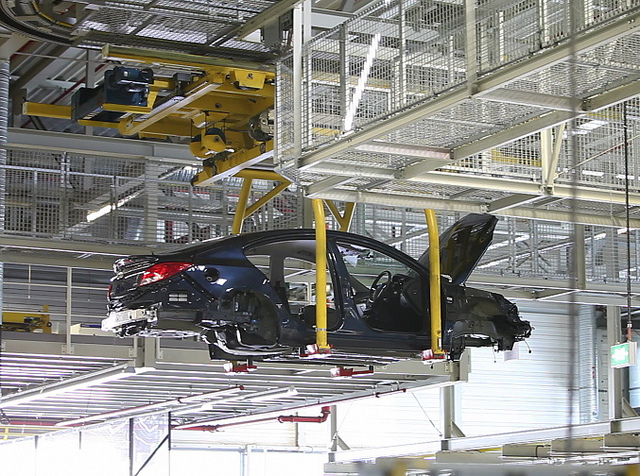You could hear jaws dropping onto factory floors right across Ontario’s auto belt last month. Export Development Canada (EDC) announced a $525-million loan to Volkswagen. The money was not to lure the company — the world’s largest automaker — to Canada. To the contrary, we’re helping finance Volkswagen’s growth 4,000 kilometers away: with expanded factories in Mexico and Tennessee, and a new plant in Mexico (producing luxury Audis).
EDC is a federally owned agency, offering loans and other supports to Canadian exporters. Why on earth would it concern itself with helping Volkswagen expand in Mexico and Tennessee? It’s not as if Volkswagen needs our help: with revenues last year of 200 billion euros, and profits of 12.7 billion euros, it can easily raise all the commercial capital it needs.
And EDC officials emphasize its support for Volkswagen is not contingent on buying anything from Canada. That, it seems, would violate the rules of “free trade.” The only requirement is that Volkswagen network with Canadian suppliers to discuss business opportunities in Mexico and Tennessee. For $525 million, that better be one heck of a “meet and greet.”
Even if Canadian suppliers did win a contract or two from Volkswagen, it’s unlikely the resulting work would occur in Canada anyway. Canadian parts suppliers have opened dozens of factories in Mexico and the Deep South — often required by their customers to locate near the final assembly plants. But EDC doesn’t mind: helping Canadian-owned firms open plants in Mexico is part of its strategy.
Mexico’s auto industry, powered by ultra-cheap labour, a growing supply base, and lucrative government subsidies, is scooping up virtually all new greenfield auto investment in North America. Eight new assembly plants have been built or announced there since 2009 (including the Audi plant). The “giant sucking sound” predicted by Ross Perot in the debate over NAFTA has become a reality. That’s bad enough. But watching a Canadian government agency actually assist that southward migration is incredible.
There’s an ugly human story behind Mexico’s industrial boom. Contrary to promises of prosperity and democracy, Mexican workers remain desperate and insecure. Real manufacturing wages have not grown; labour costs are now cheaper than in China. Independent trade unionism and other political activity is suppressed, often violently — evidenced most horrifically by the quasi-governmental assassination of 43 student protesters last year. The normal institutional forces that, in a free society, would allow Mexicans to win a fairer share of the wealth they produce (thus narrowing the gap with Canada) have been short-circuited.
Mexico produced 3.4 million vehicles last year, worth around $100 billion. Canada exported $484 million in parts to Mexico last year — and our exports are shrinking (down 30 per cent since 2001). Each dollar of Mexican output now embodies less than one half-cent of Canadian content. Our automotive deficit with Mexico exceeded $10 billion last year; our total deficit with Mexico was $23 billion.
EDC claims its loans will help us capture a few more crumbs from the auto industry’s southward migration. Its convoluted logic highlights the painful contradictions of Canada’s whole approach to autos (and other strategic industries) under NAFTA’s lopsided rules. We aren’t allowed to “subsidize” purchases of Canadian products. So why must we bribe private companies just to look at our own products — something that should be automatic under true competition?
Volkswagen sold $4 billion worth of vehicles in Canada last year. Shouldn’t we actually demand some Canadian purchases from the company, in return for all that business, instead of begging for it?
Meanwhile, back home in Germany, Volkswagen is 20 per cent state-owned, and benefits from various public technology, training and capital supports. German wages are significantly higher than Canada, yet Volkswagen hasn’t closed a German factory in decades.
Ottawa could try the same thing. Instead, it sold off its own shares in General Motors this month (for the short-term political optics of balancing its budget). It has a fund to entice auto investment to Canada, but can’t seem to spend it (automakers don’t like its unwieldy rules, and they’re infatuated with Mexico anyway). We could use other government levers (including EDC itself) to attract automakers here. Instead, Ottawa signs more trade agreements with places (like Korea) that have no more interest in Canadian cars than Mexico does.
The fatalism of EDC’s strategy is stunning. But the incoherence of Canada’s overall auto strategy is even worse.
Jim Stanford is an economist with Unifor. A version of this commentary was originally published in the Globe and Mail.
Photo: BUICK REGAL/flickr



